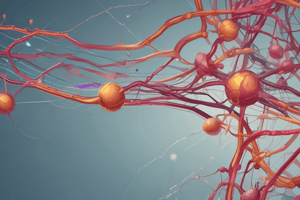Podcast
Questions and Answers
What is the main function of serum albumin in the blood?
What is the main function of serum albumin in the blood?
Regulating blood volume by maintaining the oncotic pressure
What are some molecules that serum albumin acts as a carrier for?
What are some molecules that serum albumin acts as a carrier for?
Lipid-soluble hormones, bile salts, unconjugated bilirubin, free fatty acids
In which conditions does serum albumin level decrease?
In which conditions does serum albumin level decrease?
Physiologically in late pregnancy, pathologically in liver disease, nephrotic syndrome, burns, protein-losing enteropathy, malabsorption, malnutrition, genetic variations, malignancy, increased catabolism in fever, untreated DM, and hypertension
What is the principle behind using Bromocresol green as an indicator for serum albumin?
What is the principle behind using Bromocresol green as an indicator for serum albumin?
What is the normal range of serum albumin in adults aged 20-60 years?
What is the normal range of serum albumin in adults aged 20-60 years?
How does prolonged venous stasis or dehydration affect serum albumin levels?
How does prolonged venous stasis or dehydration affect serum albumin levels?
What is the main source of production of serum albumin in the body?
What is the main source of production of serum albumin in the body?
What is the purpose of using unhaemolytic serum or plasma for collecting specimens for serum albumin testing?
What is the purpose of using unhaemolytic serum or plasma for collecting specimens for serum albumin testing?
What is creatinine and how is it eliminated from the body?
What is creatinine and how is it eliminated from the body?
How is creatine related to creatinine synthesis in the body?
How is creatine related to creatinine synthesis in the body?
What leads to a low level of creatinine clearance?
What leads to a low level of creatinine clearance?
What factors determine plasma creatinine concentration?
What factors determine plasma creatinine concentration?
What is the diagnostic importance of creatinine in evaluating kidney function?
What is the diagnostic importance of creatinine in evaluating kidney function?
How is creatine synthesized in the body?
How is creatine synthesized in the body?
What is the function of creatine phosphate in muscle tissue?
What is the function of creatine phosphate in muscle tissue?
What is the relationship between creatine phosphate and creatinine production?
What is the relationship between creatine phosphate and creatinine production?
How is creatinine eliminated from the body?
How is creatinine eliminated from the body?
Why is daily creatinine excretion considered fairly stable?
Why is daily creatinine excretion considered fairly stable?
Flashcards are hidden until you start studying
Study Notes
Serum Albumin
- Serum albumin is the most abundant blood plasma protein, produced in the liver, and forms a large proportion of all plasma protein.
- Regulates blood volume by maintaining oncotic pressure (colloid osmotic pressure) of the blood compartment.
- Serves as a carrier for molecules of low water solubility, isolating their hydrophobic nature, including:
- Lipid-soluble hormones
- Bile salts
- Unconjugated bilirubin
- Free fatty acids
- Maintains distribution of extracellular fluid.
Serum Albumin Levels
- Serum albumin levels are rarely raised, except in cases of:
- Prolonged venous stasis
- Dehydration
- Decreased serum albumin levels (hypoalbuminaemia) occur in:
- Physiological late pregnancy
- Pathological conditions:
- Liver disease
- Nephrotic syndrome
- Burns
- Protein-losing enteropathy
- Malabsorption
- Malnutrition
- Genetic variations
- Malignancy
- Increased catabolism in:
- Fever
- Untreated DM
- Hypertension
Serum Albumin Measurement
- Normal ranges for serum albumin levels vary by age:
- 0-4 days: 2.8-4.4 g/dl
- 4 days-14 years: 3.8-5.4 g/dl
- 14-18 years: 3.2-4.5 g/dl
- Adults 20-60 years: 3.5-5.2 g/dl
- Adults 60-90 years: 3.2-4.6 g/dl
- Specimen collection and handling: use unhaemolytic serum or plasma (EDTA, heparin).
Creatinine
- Creatinine is a chemical waste product in the blood that passes through the kidneys to be filtered and eliminated in urine.
- Creatinine is the chemical waste product of creatine, which supplies energy to muscles.
- Abnormal kidney function leads to low levels of creatinine clearance.
- Diagnostic importance of creatinine is to evaluate kidney function.
Creatinine Synthesis
- Creatine is synthesized in the liver from arginine, glycine, and methionine.
- Creatine is converted to creatine phosphate, a high-energy source for muscle tissue.
- Creatinine is produced as a waste product of creatine and creatine phosphate.
- Creatinine is released into circulation at a stable rate proportional to muscle mass.
- Filtered by the glomerulus and excreted in urine.
- Plasma creatinine concentration is a function of:
- Relative muscle mass
- Rate of creatine turnover
- Renal function
- Daily creatinine excretion is fairly stable.
Studying That Suits You
Use AI to generate personalized quizzes and flashcards to suit your learning preferences.



